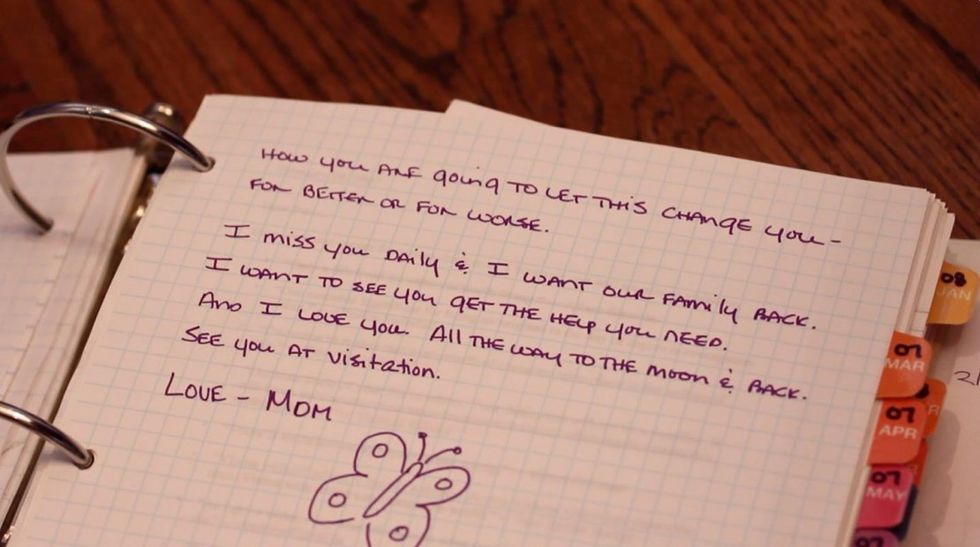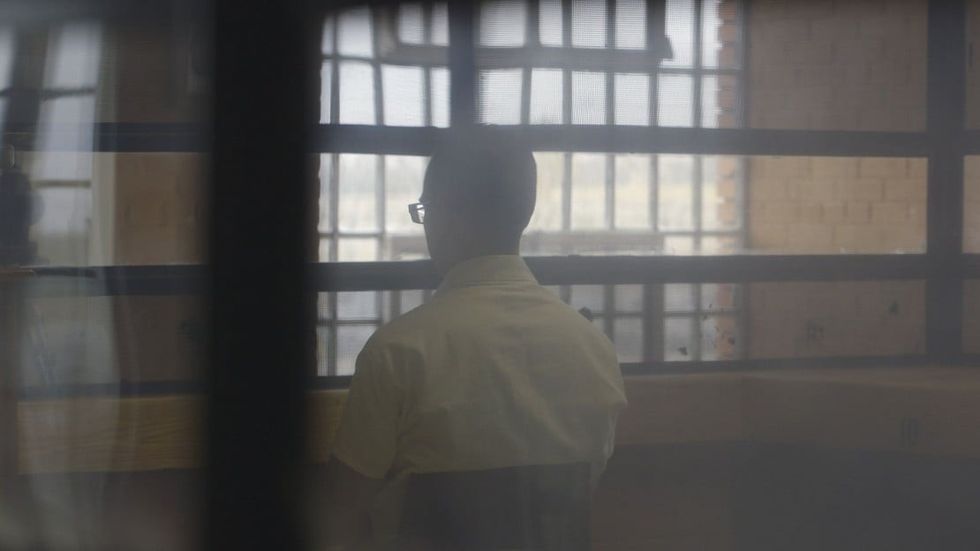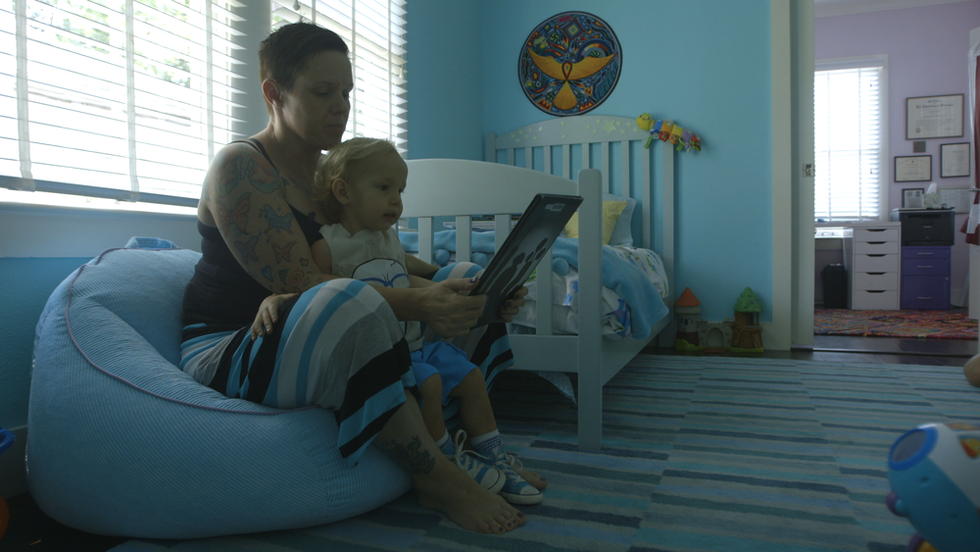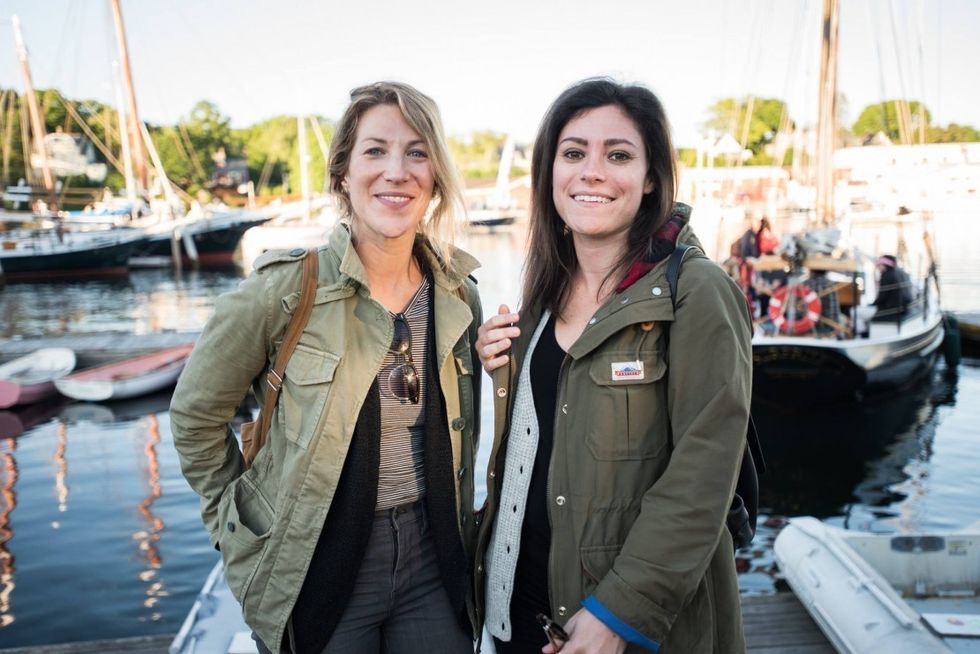What Happened Mid-Production That Made 'The Family I Had' a Must-See True Crime Doc
A powerful new film on family, murder, and the juvenile justice system joins the true crime canon.

Documentarian team Carlye Rubin and Katie Green's second feature began as an inquiry into the juvenile justice system, but they quickly felt the pull of a much more personal story. An inmate whom they were following had been sentenced to 40 years for the brutal murder of his little sister. He was just 13 at the time.
In what became The Family I Had, the filmmakers refocused their efforts onto parsing those familial threads that culminated in such a seemingly inexplicable act. Rubin and Green's exploration of this true crime headline yields a deeper look at mental illness and the trauma that is handed down through generations. The film follows three characters; the grandmother and matriarch of the family; Paris, the murderer himself, with morbidly calm interviews from maximum security; and Charity, a single mother who was left to reconcile the mourning of her daughter with her desperate need to protect the only child she had left.

The Family I Had is more than an investigative saga, it's a complex study of grief, juvenile punishment (rather than rehabilitation), and the lengths people will go to restore a family. Though the filmmakers left their initial intent behind, the themes of many broken systems persist, provoking powerful questions about who's to blame in America's constant cycle of violence.
No Film School caught up with Rubin and Green last month after the film's Tribeca Film Festival premiere. They discussed their guerrilla filmmaking process and the morality of handling such a sensitive story.
"Certain questions we waited three years to ask. And it's not easy to ask those questions, but it's important.."
No Film School: How did you, as filmmakers, walk the line between journalism and entertainment, while making sure to avoid sensationalism?
Carlye Rubin: That was an ongoing conversation and frankly continues to be, about how we handle such a sensitive story. Firstly, we're not journalists. We just realized that this was our documentation of this story and trying to be sensitive to the fact this family had been through not one, but two very profound tragedies. We didn't want to throw them under the bus, but we also wanted to remain truthful to what happened, because it's quite a unique story.
Katie Green: This is a very difficult story and some people will find it hard to have empathy for the people in the story. But we really did approach this from a place of empathy for everyone, regardless of what they did. So I think that was a challenge, to expect people to do the same, and actually encourage them to do that in a way that didn't feel heavy handed. Having to be truthful as well. There were some things that we didn't expect to come out during the process of making this film and we made the decision to that it was fair to keep those things in-fair to the family as well as our audience.
Rubin: And the decision to not include certain things as well.

NFS: How long did post-production take?
Rubin: We worked with our editor Tina Grapenthin for years, and the way we work is we cut as we go, so it wasn't like we gave her one hundred hours of footage and said, 'OK go make a film.' We were editing as we went along, and on top of that we were originally making a different film, so we had to recut a lot of things once we made the decision to change directions.
NFS: What were you making originally?
Rubin: We were doing more of a macro look at the justice system and the impact that extreme sentencing of youth has on the families. So we were following the case of Paris and his mother and the impact his sentence and his crime had on her. And the longer we were shooting, it became clear that we were making a different film.
"Always approach every shoot, even if you feel like it's just a test, as if it's the most important one."
NFS: It seems like you two really gravitate towards family dynamics, and motherhood in particular. And to return to that concept of empathy, I felt like to really emphasize with this story the way that you would have to as filmmakers, it would take a certain inherent understanding of motherhood. Do you feel like as female filmmakers, that affects the way you approach these stories?
Green: Absolutely, Carlye and I, our last film [The (Dead Mothers) Club] was about losing mothers and we always said that this film was about a mother who'd lost her children. We were immediately drawn to Charity as a really unique female character that we hadn't often seen depicted in film. She was neither a hero nor a victim. You know, she's tough and unapologetic, but she's also very sensitive and loving and has had this very forgiving approach. She's also not necessarily an easy character to take on. For us, this is a matriarchal family, these are strong women, both Charity and her mother, and yeah having central female characters that could demonstrate that kind of strength, vulnerability, and the complications around their relationships was really important.
NFS: Did you change your process at all when you shifted course?
Rubin: We got a [Canon] C300 fairly early on in production so the majority of the footage is shot on a C300. We did have some earlier footage that we shot on I think it was a 60D that doesn't quite look as rich.
Green: We were really lucky to work with a great cinematographer, Martina Radwan, who came on in the last few months and really helped us define the look and style of the film. We continued to work with the C300, but to add those touches of style...
NFS: Like what did she bring?
Green: We wanted to give a bit more to context to everybody's location because we had these three characters, who are all connected but they're not together a lot. And they all lived these quite isolated lives, and how we shot them in their environment was really important. So Martina helped us to capture that.
Rubin: In terms of craft, that certainly shifted once we made the decision to shift what we were doing. I think it's just filmmaking 101 to just be open to where the story takes you.

Green: I remember going to film Charity straight off the back of our last film. We didn't really know much about it, we just kind of showed up in Texas and filmed her. You sort of think you're going through these preliminary throwaway interviews, and actually, they end up being some of the most important interviews you get. So I advise people to always approach every shoot, even if you feel like it's just a test, as if it's the most important one.
Rubin: It's not just about the visual, it's about the content too because you can't get that emotion back. That first interview we did with Charity was incredibly raw, she was incredibly emotional, she was pregnant at the time, though you don't know that in the film. We couldn't recreate that emotion now, had we gone back three years later to reshoot that interview.
Green: It's true, in documentary you can never plan for that sort of thing.
NFS: Your film is interview-heavy, but it's never slow or disengaging. Do you have any advice on how to shoot and conduct such captivating interviews?
Rubin: Part of it is editing as you go because as you're editing, you're realizing what you're missing, what's working what's not, and the arc is coming together as you're going along.
But, putting people at ease, that's number one. This is heavy stuff and you don't just dive right in. For example, certain questions we waited three years to ask. And it's not easy to ask those questions, but it's important.
NFS: Did you feel a responsibility to protect your subjects?
Rubin: I think that's a struggle that every documentary filmmaker has. And every filmmaker I meet, it's one of the first questions I ask them. I just want to know how they deal with this incredible responsibility that we all have. And I know reporters have that responsibility too. But we have this unique privilege to be able to tell a story in any way that we want to. We can make it biased, or show what we want, or withhold information. So we're very conscious of wanting to be fair to both parties. And I think you can't help but be protective of your subjects because you know them. You've been in their homes, you've had meals with them, it's an incredibly intimate relationship.
NFS: You direct and produce as a team. Do you have different strengths? Do you collaborate on everything equally?
Green: We very much share all the roles. There are certain things that naturally one of us is more comfortable doing, but generally we try to split it equally. In documentary the roles are so much less defined. As a director, you're also the researcher, you're also finding a lot of the archive and doing a lot of producing work. You're also getting coffee and renting cars. It's not like we're very precious about our roles. Between us we cover everything.
Rubin: It's probably for a lack of funding, to be perfectly honest. I guess if you had the money, you'd have a lot more help.

NFS: What made the funding process so difficult?
Rubin: Well for starters we pivoted very late. We first pitched this film at TFI Network last year. So we had a year to acquire funding and basically start from scratch on a film that we'd been working on already for two and a half years. I'm not sure how funding-body-friendly this film is. It's not waving some sort of issue flag, of course there are strands of it, but it's not a clear cut film about the prison system, or about mental illness; it brings up all of those topics and certainly lends itself to a lot of different conversations, but it doesn't fit into a box.
And also directors are the last ones to be paid, if you're paid. Any time we got funding, we were like, we can't take money right now because we need to pay this person, or we need to do this. You have to put yourself last because at the end of the day, it's how you get the film done.
Maybe it's the fact that we've only made one other film before, so we're still relatively fledgeling filmmakers ourselves. I guess if we knew, we'd have the money!
NFS: Do you have advocacy-specific plans for your release?
Green: We had plans for the film about juveniles in the prison system, and we certainly come from that perspective. I think this would be a difficult film to use as an advocacy piece, but we do think that it pushes that conversation a bit further. Instead of being a film that's going to tell you what to think and feel, it's pushing you to actually be asking those questions yourself. We hope it does that, anyway. We'd like this film to be something that starts a conversation about juvenile justice, about mental health, about storytelling, about trauma, and about how trauma is passed down through generations.
For more, see our complete coverage of the 2017 Tribeca Film Festival.













